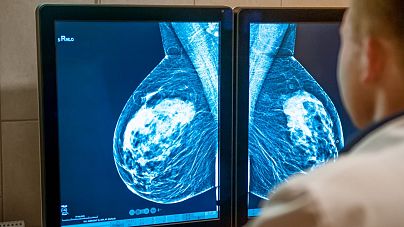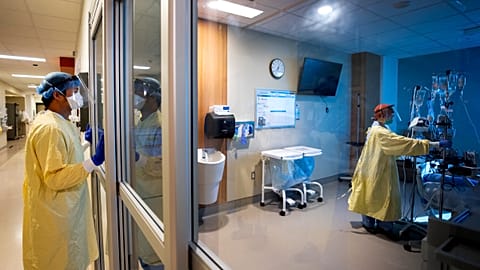German start-up Vara's tech may help doctors detect breast cancer earlier.
Artificial intelligence (AI) is showing promising results in detecting breast cancer which may otherwise have been missed by radiologists, the largest study of its kind has found.
 ADVERTISEMENT
ADVERTISEMENT
 ADVERTISEMENT
ADVERTISEMENT
Researchers in Germany discovered that AI can correctly detect interval breast cancers, which develop in between routine screening rounds (usually 24 months in many countries) and can be missed and diagnosed as a false negative result.
In 2020, there were 2.3 million women diagnosed with breast cancer and 685 000 deaths globally, according to the World Health Organization (WHO).
The peer-reviewed study showed approximately 16 per cent of interval cancers are probably visible during a previous screening while one in five may be too subtle to the human eye and can be missed by radiologists, which is known as "minimal signs".
The findings present an opportunity to detect more cancers at a screening with AI, which may help detect breast cancer earlier.
German deep-tech start-up Vara conducted the study in partnership with The Mammography Reference Centre North in Oldenburg. The results have been published in the European Journal of Radiology.
Vara assessed 2,396 screening mammograms from women who were later diagnosed with an interval cancer.
The study found that AI could detect and correctly localise on the mammogram 27.5 per cent of false-negative cases and just over 12 per cent of minimal signs of cancer.
"Interval cancers are the ones that just appear spontaneously during the screening interval," said Danalyn Byng, Clinical Research Lead at Vara.
Vara assessed 2,396 screening mammograms from women who were later diagnosed with an interval cancer.
The study found that AI could detect and correctly localise on the mammogram 27.5 per cent of false-negative cases and just over 12 per cent of minimal signs of interval cancers.
"Interval cancers are the ones that just appear spontaneously during the screening interval," said Danalyn Byng, Clinical Research Lead at Vara.
"What was really interesting was that the algorithm did have some kind of increased suspiciousness score for some mammograms, despite there being nothing on the image at screening," she told Euronews Next.
How does it work?
She said in 3 per cent of true interval cancer cases the algorithm could also correctly localise where breast cancer would later appear.
The study worked by an algorithm, which can categorise the mammograms into three categories: cancer suspicious, normal and unconfident. The cancer suspicious studies and the unconfident ones were passed on to the radiologist.
So as not to bias the radiologist, they were not told which mammograms could have cancer. If the radiologist made a prediction the algorithm disagreed with, only then would the algorithm raise the alarm.
But this does not mean that machines will replace radiologists.
“It’s a very collaborative approach where we're not fully replacing a radiologist, but we are complementing their skills because the algorithm, the internal workings of it, it uses this concept of confidence,” said Byng.
Why early detection is key
The technology holds the promise of diagnosing breast cancers earlier, which means better outcomes for women, not only in terms of their survival but also in finding cancers at a stage where they are more easily treatable.
Earlier detection can also make breast cancer treatment more affordable in lower-income countries. For the moment, Vara is working in Germany, Greece and Mexico but plans on expanding in Asia and Africa and places where breast cancer screening is limited.
"Vara was trained and evaluated on data from very highly trained German radiologists and when we're moving into other countries without established breast cancer screening programmes. They do have radiologists, but those radiologists may not be accustomed to doing breast cancer screening tasks," said Byng.
When they get a mammography, it's from a woman who probably already has symptoms, she added.
"So our goal is really to bring our technology and use it to bring breast cancer screening into countries to help them ramp up breast cancer screening programmes because population demographics in those settings are really changing.
"And breast cancer maybe has not been in the past such an important public health issue. But that's changing. And it's going to be changing even more quickly in the coming years," Byng said.


















